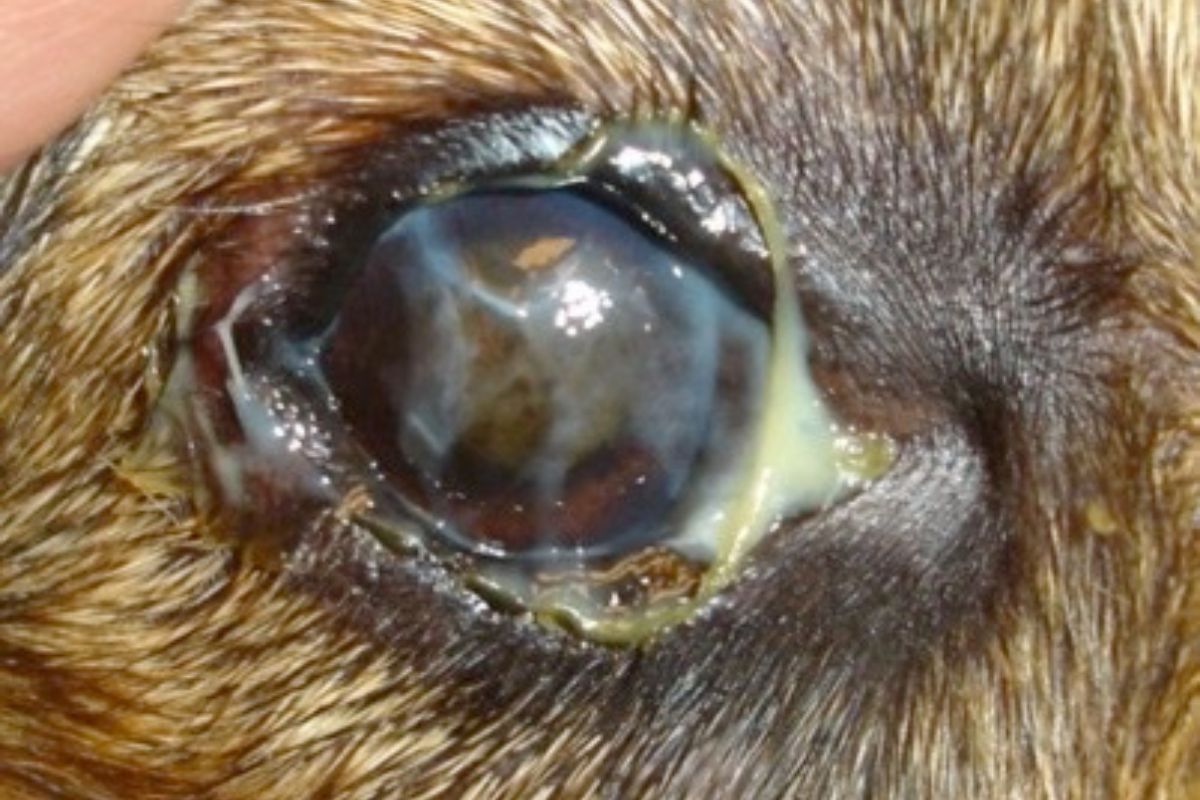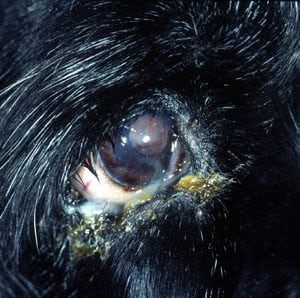Pet Keratoconjunctivitis Sicca (KCS) in Spring, TX
Learn about Pet Keratoconjunctivitis Sicca (KCS) treatment options at North Houston Veterinary Ophthalmology in Spring, TX. Ensure your pet’s eye health today.

Pet Keratoconjunctivitis Sicca (KCS)
Pet Keratoconjunctivitis Sicca (KCS), or dry eye, is a condition marked by reduced tear production, which leads to corneal inflammation, pigmentation, and often painful ulceration. Symptoms will also typically include cloudiness and frequent, unnaturally colored discharge. These signs can indicate serious eye discomfort and should not go ignored.

Signs of KCS in Pets
KCS can cause considerable pain. Common symptoms include:
- Squinting
- Rubbing the eyes
- Light sensitivity (photophobia)
- Redness in the eyes
- Cloudiness
- Yellowish, viscous ocular discharge
Identifying these signs early and seeking veterinary care is crucial to prevent further issues.
Causes of KCS
Immune-Mediated Causes: The most prevalent cause of KCS in dogs is immune-mediated. Breeds such as the Cavalier King Charles Spaniel, English Bulldog, West Highland White Terrier, Shih Tzu, Lhasa Apso, Pug, and Cocker Spaniel have an increases incidence of KCS. Even though KCS is more common in some breeds, it can be found in all breeds.
Other Causes:
- Drug Toxicity: Certain medications, such as sulfa drugs, Etogesic, and atropine, can induce KCS.
- Infections: Conditions like canine distemper and leishmania.
- Neurologic: Damage to the nerves that supply the cornea or tear glands.
- Hormonal Disorders: Diseases such as diabetes, Cushing’s disease, and hypothyroidism.
- Surgical Excision: Removal of the gland of the third eyelid (cherry eye).
Understanding the root cause of KCS is important for effective treatment.
Treatment Options for KCS
North Houston Veterinary Ophthalmology offers both medical and surgical treatments for pets with Keratoconjunctivitis Sicca.
Medical Treatment:
- Topical Immune Modulators: Medications like cyclosporine and tacrolimus can boost tear production in about 80% of dogs with KCS.
- Artificial Tears: High quality artificial tear lubricants offer additional lubrication, help to decrease the abrasive effect the eyelids have on the dry corneal surface, and help to stabilize what tear film the pet does have.
- Topical Anti-Inflammatory Medication: In some cases, a topical anti-inflammatory is also utilized to help control the inflammation that occurs secondarily to inadequate tear production.
Surgical Treatment:
- Parotid Duct Transposition: If medical treatment fails to stimulate enough tear production, then a surgical procedure called a parotid duct transposition is recommended. This surgical procedure relocates one of the salivary ducts to the eye in an effort to improve ocular moisture.
- Episcleral Cyclosporine Implants: If your pet responds well to topical cyclosporine treatment, but giving regular medication is difficult, then your pet may be a candidate for a surgically placed cyclosporine implant.
Benefits of Choosing North Houston Veterinary Ophthalmology
- Experienced Veterinary Ophthalmologists: Our team is adept at diagnosing and treating ocular conditions.
- Customized Treatment Plans: Individualized plans cater to the specific needs of each pet.
- Post-Treatment Support: Ongoing care ensures the best outcomes for your pet.
Early Detection is Crucial
Early detection and treatment of Keratoconjunctivitis Sicca are essential to prevent long-term damage and discomfort. Regular eye check-ups can catch KCS early, allowing for prompt treatment. If your pet shows signs of ocular discomfort, seek care immediately.
Schedule an Appointment
If your pet exhibits signs of KCS, contact North Houston Veterinary Ophthalmology. Our team is committed to providing high-quality care to ensure your pet’s eye health and overall well-being. Schedule an appointment today to learn how we can help manage and treat Keratoconjunctivitis Sicca.